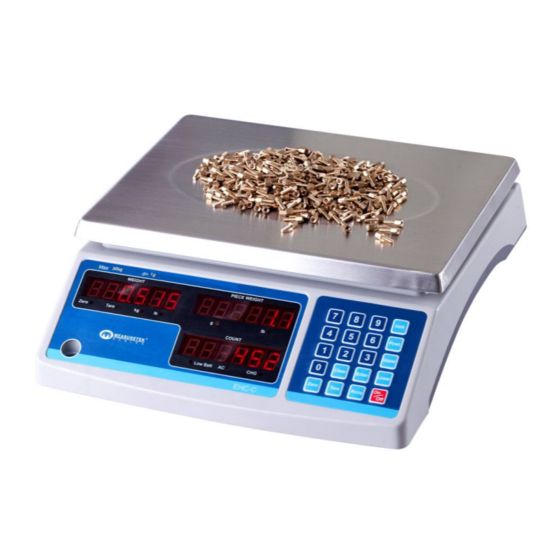Summary of Contents for Measuretek EHC-C Series
- Page 1 W W W . M E A S U R E T E K . N E T EHC-C User / Technical Manual Contents subject to change without notice Version 1.0 7/2013...
-
Page 2: Table Of Contents
TABLE OF CONTENTS INTRODUCTION........................1 General and Safety Information ..........................1 Specifications ................................1 Unpacking and Setup ......................2 Contents ................................. 2 OVERVIEW OF CONTROLS AND FUNCTIONS .................. 2 Indicator Display ..............................2 Function Keys ................................3 OPERATIONS ........................3 Normal Weighing Mode.............................. -
Page 3: Introduction
External Interface RS232 Safe Overload Capacity 150% of capacity Platter Dimensions (L x W) 11.4” x 8.7” (290 x 220 mm) Scale Dimensions(L x W x H) 13.5” x 11.6” x 4.5” (294 x 342 x 115 mm) EHC‐C www.measuretek.net . 1 . ... -
Page 4: Unpacking And Setup
COUNT – Calculated number of pieces base on total weight and piece weight Low Batt - Battery should be charged soon AC - AC power is being used CHG - Battery is charging EHC‐C www.measuretek.net . 2 . ... -
Page 5: Function Keys
9. When finished weighing, press the ZERO/ON/OFF key for 4 seconds to power off the scale. Setting the Tare Weight This scale allows for both a manually entered pre-set tare weight, as well as a “weighed” tare weight. 1. To enter a weighed tare: EHC‐C www.measuretek.net . 3 . ... -
Page 6: Counting Mode
Use the number keys to input the known piece weight. Press the Enter key to confirm or press the ZERO/ON/OFF key to exit this mode without storing the piece quantity. Note: The piece weight must be greater than the minimum piece weight (see Specifications) or a EHC‐C www.measuretek.net . 4 . ... -
Page 7: Accumulation Mode
Note: Limits should be: Upper limit ≥lower limit>0. If the upper limit is less than lower limit or if the upper limit is set as zero, check weighing is disabled. 5. To turn check weighing off, follow the above instructions and change the upper limit to zero. EHC‐C www.measuretek.net . 5 . ... -
Page 8: Storing Piece Weights And Tares Into Memory
PIECE WEIGHT window. Use the number keys to enter the new piece weight and press the Enter key to confirm, or press the ZERO/ON/OFF key to exit this mode. EHC‐C www.measuretek.net . 6 . ... - Page 9 7. The scale will move back to step 1 to enter the next address number and stored information, or press the ZERO/ON/OFF key to exit this mode. Note: A flow chart diagram outlining the above process is shown in Figure 1. Figure 1 - Storing Piece Weights and Tares into Memory Figure 1 EHC‐C www.measuretek.net . 7 . ...
-
Page 10: Recalling Piece Weights And Tares From Memory
If there is an error occurred in calibration, the scale will display “ ” (this normally means incorrect data input or loading weight), please return back to the last step or use ZERO/ON/OFF to exit the calibration mode. EHC‐C www.measuretek.net . 8 . ... -
Page 11: Parameter Setup Mode
Note: See page 11 for display definitions and character key entry definitions. Pressing a key multiple times quickly will cycle through the available characters for that key. Pausing will select that character and advance to the next. EHC‐C www.measuretek.net . 9 . ... -
Page 12: Serial Communication Details
Where: <LF> = Line Feed character (hex 0AH) <CR> = Carriage Return character (hex 0DH) <EXT> = End of Text character (hex 03) Note: Business, Product, ID, Date, and Time can only be exported if they have been set by the operator. EHC‐C www.measuretek.net . 10 . ... -
Page 13: Definitions
Example: To enter “nut 8”, press the 5 key three times, pause, press the 7 key three times, pause, press the 7 key twice, pause, press the zero key once, pause, and press the 8 key once. Display Character Definitions EHC‐C www.measuretek.net . 11 . ... -
Page 14: Symbol Definitions
L d - Input the load weight dSP. o vr - Data length exceeds the LED display digits CAL. o N - Calibration enable switch is ON CAL. o FF - Calibration enable switch is OFF EHC‐C www.measuretek.net . 12 . ... -
Page 15: Troubleshooting
Incorrect counting Sampling quantity is too small. result when using Calculated piece weight is slightly different from Increase the sampling quantity. SPL to enter a piece the real value. weight Lo.bAt is shown Battery is discharged Charge battery EHC‐C www.measuretek.net . 13 . ... -
Page 16: Battery And Charging
MeasureTek’s liability under this warranty is limited to the repair or replacement of the defective product and in no event shall MeasureTek be liable for consequential or indirect damages.













Need help?
Do you have a question about the EHC-C Series and is the answer not in the manual?
Questions and answers